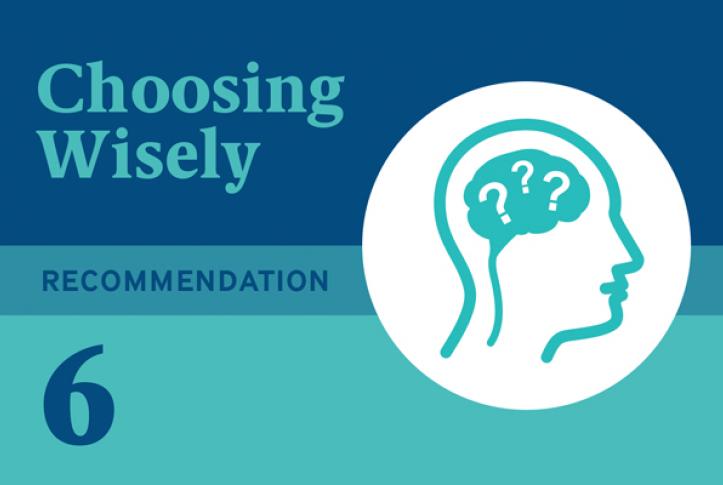Background
The Choosing Wisely Canada Geriatrics and Psychiatry lists of recommendations include avoiding unnecessary antipsychotics for elderly adults. Antipsychotics should only be prescribed to treat behavioral symptoms of dementia when other strategies have failed. Long-term use of antipsychotics in elderly patients has significant harms and side effects, such as increasing risks of confusion, falls, pneumonia, and delirium.
Yet, the Canadian Institute for Health Information (CIHI) released a report showing 39 percent of seniors in long-term care (LTC) facilities had taken an antipsychotic medication in 2014, with 22.4 percent of residents considered chronic antipsychotic users.
The Innovation
The Appropriate Use of Antipsychotics Project (AUA) was motivated by data showing 26.8 percent of Alberta’s LTC residents were chronic antipsychotic users. The AUA Project supported monthly antipsychotic medication reviews and nonpharmacologic strategies for responsive behaviors in dementia. The Choosing Wisely Canada resource, Treating Disruptive Behaviour in People with Dementia, supported conversations with families about reducing antipsychotics. Choosing Wisely Alberta, a regional hub of Choosing Wisely Canada, collaborated with the Seniors Health Strategic Clinical Network™ (SCN) to support these practice changes. A presentation at the 2016 National Choosing Wisely Canada conference generated additional support for AUA.
Population Targeted
LTC staff and residents in the province of Alberta, Canada. A pilot intervention was implemented in 11 LTC facilities in 2013–14 by the Seniors Health SCN. The following year it was introduced to all 170 LTC facilities, with 14,500 total beds. The intervention has since been introduced in 165 assisted living (AL) facilities and 10 hospitals (Elder Friendly Care).

Key Features of the Innovation
Verdeen Bueckert, a senior practice consultant with the Seniors Health SCN, describes how lessons learned from the 11 pilot sites were presented to teams of leaders, nurses, care aides, and pharmacists at Innovation Collaboratives (Institute for Healthcare Improvement model). These workshops generated awareness of the issues and inspired interest in more effective strategies. Care teams then learned knowledge and skills to shift practice. The teams returned to their facilities, shared resources with peers and tested improvements in PDSA (Plan-Do-Study-Act) cycles. Bueckert highlighted the importance of “staff feeling supported in these changes, because reducing antipsychotics requires significant culture change.”
The Appropriate Use of Antipsychotics Toolkit was developed as a provincewide resource, so that “site-based managers and educators could lead locally, and didn’t need to reinvent the wheel,” Bueckert said.
In addition to educating and engaging staff and families about nonpharmacologic alternatives to antipsychotics, teams were supported to:
- Establish an interdisciplinary team to assess antipsychotic appropriateness monthly
- Agree on appropriateness criteria for antipsychotic use
- Taper residents off potentially inappropriate antipsychotic prescriptions
- Implement nonpharmacologic strategies such as support of sleep and meaningful activities.

Antipsychotic use decreased by more than 36% in long-term care (LTC) facilities because of the intervention.
Evidence of Impact
LTC antipsychotic use decreased by more than 36 percent. In 2019, just 17 percent of the province’s LTC and AL residents, without a chronic mental health condition, were using antipsychotics. The 2020 goal is to have 80 percent of LTC facilities within 10 percent to 20 percent.
Staff reported residents became more alert and independent. Families shared stories of loved ones “waking up.” Bueckert notes clinicians and staff were more satisfied with their jobs and felt pride in seeing residents improve. “Care teams felt celebrated and that they were making a difference. We showed people data and told their stories to demonstrate what was possible. We told them they were leading the way for Canada.”
Sharing and Spreading the Innovation
The Seniors Health SCN has shared this work through the AUA Toolkit, provincial and national media and in videos, peer-reviewed journal articles, and presentations. Choosing Wisely Canada supported development of a toolkit called “When Psychosis Isn’t the Diagnosis,” which has been downloaded nearly 6,000 times. This toolkit, along with others, has been adopted by the American Medical Association on its “Steps Forward” website.
Contact for Further Information
Appropriate Use of Antipsychotics Project Team, [email protected]


